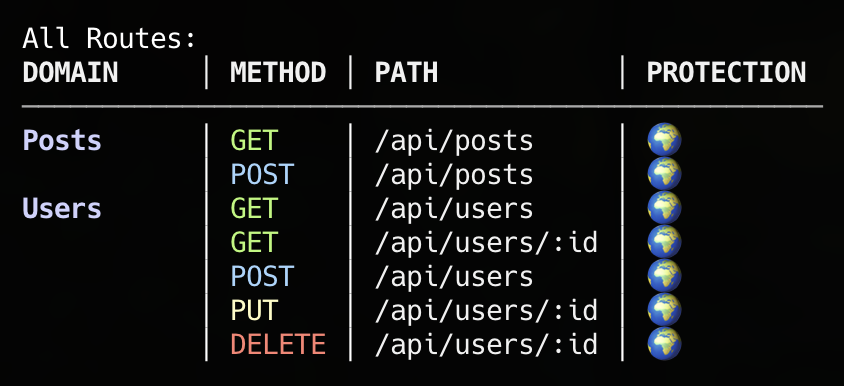0.4.0 • Published 8 months ago
express-route-visualizer v0.4.0
Express Route Visualizer
A lightweight utility to extract and display Express.js application routes in clean format.
Features
- 🧭 Clear route overview: Displays all your API routes in a structured format
- 🔍 Domain filtering: Filter routes by specific domains for focused views
- 🔒 Authentication indicators: Clearly shows which routes are protected
- 📐 Flexible filtering: Filter routes by protection status and custom criteria
- 📊 Easy integration: Works with any Express.js application
Installation
npm install express-route-visualizerUsage
Basic Usage

const express = require("express");
const { displayRoutes } = require("express-route-visualizer");
const app = express();
// Define your routes
app.get("/api/users", (req, res) => res.send("Get users"));
app.post("/api/users", (req, res) => res.send("Create user"));
app.get("/api/products", (req, res) => res.send("Get products"));
// Display all routes when your app is ready
displayRoutes(app);With TypeScript
import express from "express";
import { displayRoutes, DisplayRoutesConfig } from "express-route-visualizer";
const app = express();
// Define your routes
app.get("/api/users", (req, res) => res.send("Get users"));
app.post("/api/users", (req, res) => res.send("Create user"));
// Display routes with configuration
const config: DisplayRoutesConfig = {
filterDomain: "users",
};
displayRoutes(app, config);Configuration Options
You can customize the route display with the following options:
| Option | Type | Default | Description |
|---|---|---|---|
domainFilter | string \| string[] | undefined | Filter routes by domain (e.g., "users" will match "/api/users/*") |
showUnprotectedOnly | boolean | false | Only show routes that don't require authentication |
isProtected | (route: RouteInfo) => boolean | undefined | Custom function to determine if a route is protected |
includeFilter | (route: RouteInfo) => boolean | undefined | Custom function to include only routes that match criteria |
excludeFilter | (route: RouteInfo) => boolean | undefined | Custom function to exclude routes that match criteria |
protectionMiddlewareName | string \| string[] | undefined | Name or names of middleware functions that indicate a protected route |
Authentication and Protected Routes
Routes are only marked as protected when you provide either:
- A custom
isProtectedfunction, or - A specific middleware name via
protectionMiddlewareName
By default, all routes are considered unprotected unless you specify how to identify protected routes.
Example with protectionMiddlewareName
// Specify which middleware indicates a protected route
displayRoutes(app, {
protectionMiddlewareName: "requiresAuthentication",
});Example with custom isProtected function
// Use a custom function to determine if routes are protected
displayRoutes(app, {
isProtected: (route) => {
// Consider routes with 'admin' in the path as protected
return route.path.includes("admin") || route.middlewares.some((middleware) => middleware.name === "requiresAuthentication");
},
});Example with multiple protection middleware names
// Specify multiple middleware names that indicate protected routes
displayRoutes(app, {
protectionMiddlewareName: ["requiresAuthentication", "requiresAdmin", "checkJwt"],
});Advanced Examples
Custom Filtering
// Show only GET routes
displayRoutes(app, {
includeFilter: (route) => route.method === "GET",
});
// Exclude auth routes
displayRoutes(app, {
excludeFilter: (route) => route.path.includes("/auth"),
});
// Custom protection detection
displayRoutes(app, {
isProtected: (route) => {
// Consider routes with 'admin' in the path as protected
return route.path.includes("/admin") || route.middlewares.some((middleware) => middleware.name === "requireAuth");
},
});Filtering by Multiple Domains
// Show routes from multiple domains
displayRoutes(app, {
filterDomain: ["users", "products"],
});Development
Linting
# Run linting
npm run lintRunning Tests
# Run tests
npm testCI/CD
This project uses GitHub Actions for continuous integration. The following checks run on each push to main and pull request:
- Linting (ESLint)
- Type checking (TypeScript)
- Building the project
- Running tests
You can see the status of these checks in the GitHub repository under the "Actions" tab.
License
MIT



